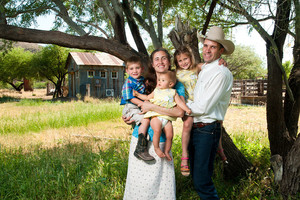29 Mar Mon 2010
Food Inc.
29 March 2010,
We just finished watching the movie Food Inc., at the house with some family friends who checked it out from the library before they departed on their spring break vacation trip.
Wow. It made me so very sad. Mad too. I felt my heat rise noticeably during the movie at certain parts.
It achieves its intended objective. It is clear that the movie is extremely slick and full of emotional appeals, and they work. (Not that getting me to be emotional is necessarily a hard thing to do, ask Paul) However, the movie really plays itself up with the "Terminator" music at parts, "Cops"-like filming at others. But it tells a story that needs to be told.
While Paul had seen the movie at a previous showing where he was part of a panel of speakers in Phoenix, I had not seen it because I grew up on PETA, HSUS, and GreenPeace magazines, so I didnt really feel as though I needed to see it again. I've felt the emotional anguish and helpless frustration already, why put myself through it again? Well, because many of my customers have seen the movie and want to know what I think of it. And also, more importantly, because our friends came down to spend part of their kids' spring break with us at the ranch and they wanted to watch the movie with us and discuss it together. They are very thoughtful people so I knew that this would be a good time, even if it was heart-wrenching.
Some of our main discussion points were that the companies are only doing what the customers want. They demand cheap, uniform food; the industry, by virtue of government subsidies, can do that, and will do it so that they remain viable. If the customers really demanded different, the companies would produce a different product. However, is there really a equitable and open transaction going on there? Not really, the customers do not see the true costs of their food, the true story behind what it takes to get them the cheap chicken, beef and pork at they so enjoy. The customers, however, do not want to know what it takes to make this food, they put blinders on and say, "get me this, I don't care how you do it and what it takes to get it." They don't know the spiritual, de-humanizing, earth-polluting, dangerous costs of their food -- but most importantly I think that many of them do not want to know it. If it doesn't look like an animal part when you buy it in the store, you can make believe that you are not morally responsible for its death and its cruel, painful, degrading and toxic life.
Industrial agriculture is toxic, I believe, on more levels than just one. I think that the spiritual, moral and social toxins that it produces are eating away at our society - and we see the effects of this in how children treat animals, treat eachother, and relate to the world around them.
The parts of the movie that talk about E-Coli are perhaps the most tear-jerking, but also the most conflicted for me. I hear the mother and food safety advocate saying that she wants more government regulation and influencing of the food chain, and I do not believe that this is the solution.
The true danger comes when government interferes. More regulation will mean that the big companies will just do the bare minimum of compliance, continue to interfere with and affect application of laws, and more of the small, transparent organizations will be forced out of business because of the burdens of more regulation. We don't need one 'government approved' meat processing facility with no direct connection with the consumers, we need hundreds of thousands of small processing facilities who practice open transparent operations that are supported directly by consumers of their beef - that is where integrity in the system comes from. If a business directly stands to benefit if the consumers are healthy and safe buying their food from it, then it will do all it can to ensure this. if government regulations are the only thing driving food safety, then corners will continue to be cut.
The mistreatment of animals in the movie is what always greatly bothered me as a vociferous and emotional vegetarian teenager, it still does. It makes me sad for our society that we have 'come this far'. I don't think there is any going back and that makes me sad for my children.
It does make me feel better about what we do, we treat our animals with respect and caring, they live lives with dignity and meet ends that are low-stress and as quick and painless as possible. I still do not eat pork, because we do not produce pork, and after seeing this movie I remain confident in that position.

